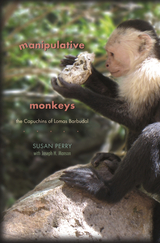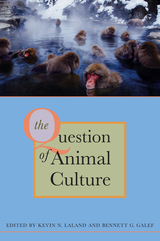
For over 25 years, primatologists have speculated that intelligence, at least in monkeys and apes, evolved as an adaptation to the complicated social milieu of hard-won friendships and bitterly contested rivalries. Yet the Balkanization of animal research has prevented us from studying the same problem in other large-brained, long-lived animals, such as hyenas and elephants, bats and sperm whales. Social complexity turns out to be widespread indeed. For example, in many animal societies one individual's innovation, such as tool use or a hunting technique, may spread within the group, thus creating a distinct culture. As this collection of studies on a wide range of species shows, animals develop a great variety of traditions, which in turn affect fitness and survival.
The editors argue that future research into complex animal societies and intelligence will change the perception of animals as gene machines, programmed to act in particular ways and perhaps elevate them to a status much closer to our own. At a time when humans are perceived more biologically than ever before, and animals as more cultural, are we about to witness the dawn of a truly unified social science, one with a distinctly cross-specific perspective?

With their tonsured heads, white faces, and striking cowls, the monkeys might vaguely resemble the Capuchin monks for whom they were named. How they act is something else entirely. They climb onto each other’s shoulders four deep to frighten enemies. They test friendship by sticking their fingers up one another’s noses. They often nurse—but sometimes kill—each other’s offspring. They use sex as a means of communicating. And they negotiate a remarkably intricate network of alliances, simian politics, and social intrigue. Not monkish, perhaps, but as we see in this downright ethnographic account of the capuchins of Lomas Barbudal, their world is as complex, ritualistic, and structured as any society.
Manipulative Monkeys takes us into a Costa Rican forest teeming with simian drama, where since 1990 primatologists Susan Perry and Joseph H. Manson have followed the lives of four generations of capuchins. What the authors describe is behavior as entertaining—and occasionally as alarming—as it is recognizable: the competition and cooperation, the jockeying for position and status, the peaceful years under an alpha male devolving into bloody chaos, and the complex traditions passed from one generation to the next. Interspersed with their observations of the monkeys’ lives are the authors’ colorful tales of the challenges of tropical fieldwork—a mixture so rich that by the book’s end we know what it is to be a wild capuchin monkey or a field primatologist. And we are left with a clear sense of the importance of these endangered monkeys for understanding human behavioral evolution.

READERS
Browse our collection.
PUBLISHERS
See BiblioVault's publisher services.
STUDENT SERVICES
Files for college accessibility offices.
UChicago Accessibility Resources
home | accessibility | search | about | contact us
BiblioVault ® 2001 - 2024
The University of Chicago Press









